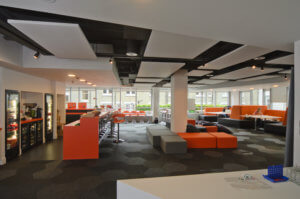How Millennials Are Customizing Their Companies
Published on July 7, 2017, at 5:30 p.m.
by Jessica Banks.
They’re excited, they’re determined and they’re hungry for the real world. Millennials are entering the workforce with a certain perseverance that is influencing the corporate world in more ways than one.
Today, you can bring your dog to work, drink a casual beer at your desk and even move your desk to the other side of the globe. It’s no question that millennials are entering a workforce that does not seem whole lot like ‘work.” With companies eager to land top talent from around the world, they are having to change their office culture and benefits to accommodate to the luxurious, spontaneous lifestyle of their future employees.

In some ways, millennials are customizing their dream jobs. They are aware the advantages offered by some of the top jobs in the market and are eager to see who will offer them the best contracts. Hiring managers are having to keep up with the latest trends in order to present a company that will interest the younger generations.
Some companies are even changing their address to get the right attention. Relocation is a bold, but often beneficial change that some companies are enduring to remain relevant. Being involved in the PR industry often places you in some of the most influential cities in the world. Leading PR companies like Edelman and Deloitte have headquarters in New York and Chicago to place themselves in the prime location for success. Not only do companies thrive in these locations, but job-seekers are drawn to the excitement buzzing throughout them. The city life offers the opportunity to work at some of the leading firms in the industry while providing the social life people in their early 20’s can only dream of. Work hours can be demanding but they are paired with valuable connections and exciting benefits.
Aetna, an American managed healthcare company, recently made the executive decision to relocate their headquarters to New York. While their main branch in Hartford, Connecticut will still be considered a successful component of Aetna’s brand, CEO Mark Bertolini recognized the room for growth beyond the smaller New England state.
Bertolini released the following statement at a press conference held this past week:
“As a state, we need to act boldly to change the things that need to change. Across the country, companies are locating in places where they can recruit top talent. [W]e have to recognize that strong, fiscally-sound, culturally-vibrant metropolitan areas are key to economic growth.”
When asked about what she looks for in a company, Cara Limoges, a recent graduate from the University of Alabama said, “I look for a job where I could be valued, for sure. I also think normal benefits like health care are always appreciated. When it comes to other benefits, though, I really look for good vacation time because I’m so young and there’s still so much more exploring to do.”
Vacation time is something to consider when choosing which job is best suited for you. Something companies are offering in addition or, in some cases, in replacement of that benefit, though, is the opportunity to work from home.
According to research done by Colin Roper at Gusto.com, the average American receives 10 days of vacation time off per year. The other 355 days are full of required work. To make that number more attractive, companies have been changing their policies to include the WFH benefit.
The WFH acronym is one that has been surfacing more frequently than previous years. WFH stands for “Work From Home” and is one of the most appealing benefits to millennials offered in today’s job market. Collaboration has been proven successful, if not more, in different places than just the office space. Companies are granting their employees the opportunity to travel various countries, explore new surroundings or even work from the couch in their living room all while continuing to grow their brand. This is not a one-sided advantage, either. The employees are able to connect with other individuals in their company’s field to build relationships these locations to benefit their employers, too.
Aishwarya Kumar, international writer at ESPN.com, discussed the appeals of the “work-from-wherever” benefit that many companies are offering today.
“Almost every millennial is into this,” she explained. “They love the freedom to work wherever they want, so much so that a new program called Remote Year has become increasingly popular.”
According to their website RemoteYear.com, “Remote Year brings together inspiring communities of 50-80 freelancers, entrepreneurs, and professionals for a year-long journey to work, travel, and live in 12 different cities throughout the world.” The program allows you to immerse yourself in the cultures of various cities while completing your work abroad.
“It’s is definitely on my bucket list,” Kumar went on to explain.

When her work requires her to be in the office, she does not seem too discouraged, however. She explained how the traditional office space has been transformed into a type of work place where relaxation, and sometimes play, is encouraged. Cubicles and desks are being moved around to reflect a more open environment; a place where creativity can be expressed more freely. Some companies even have break rooms with bean bags, pillows and other game tables to provide the ultimate escape from a stressful work day, and stress becomes a stranger when you are able to bring your dog to work with you; another benefit some companies are providing.
You can bring your four-legged friend to work, play Xbox in your free time and even take your work load abroad. Working in today’s office has drastically changed from years before. Millennials have influenced companies to change the original office policies from their dress codes to headquarter locations. The traditional office space is constantly being reinvented to interest the young professionals of the world.
Thanks to these changing interests, the “traditional office culture” has been completely redefined.




